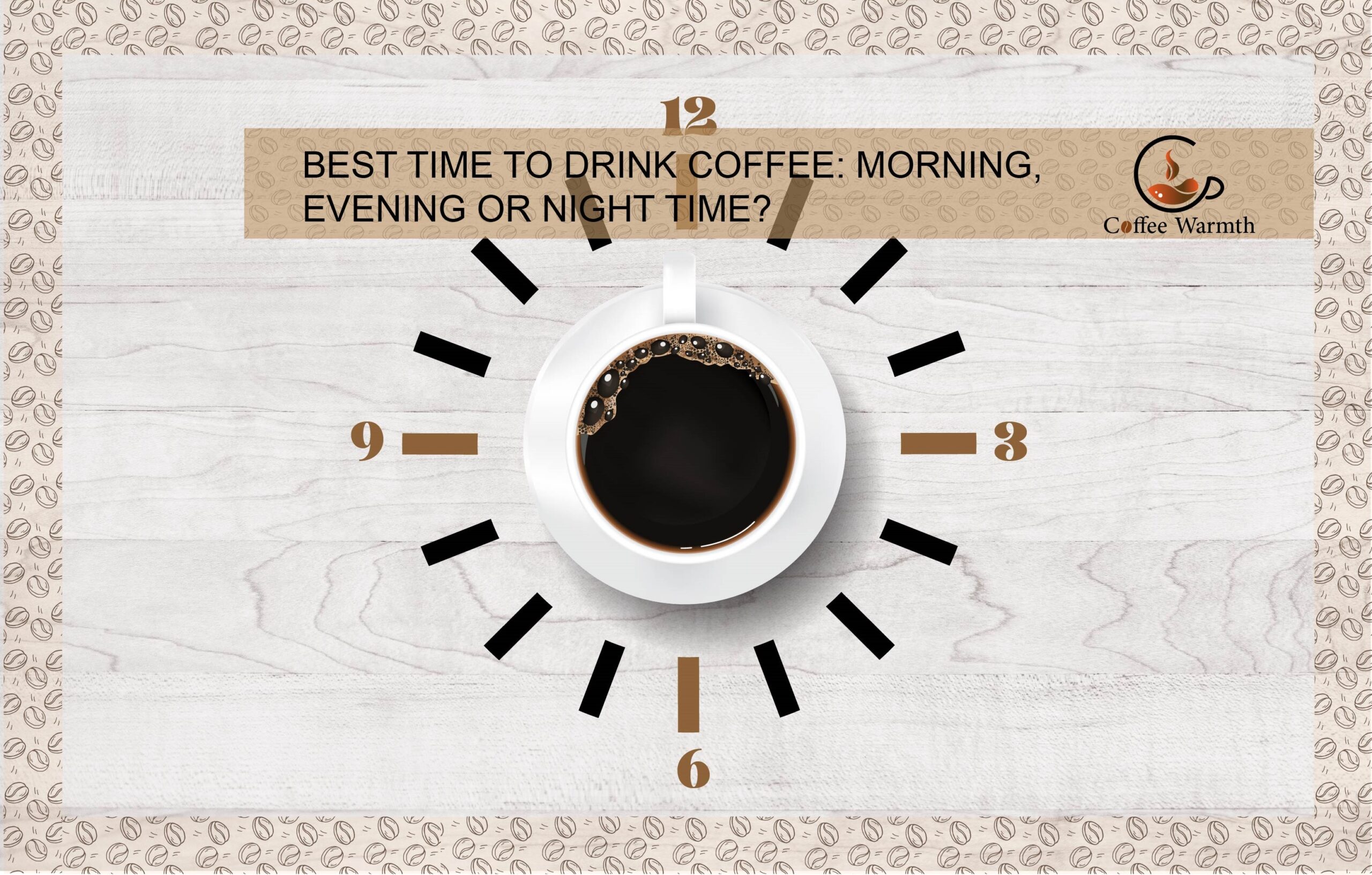The best time to drink coffee is between 9 am – 4 pm preferably after a meal. Drinking coffee during this time helps maximize the health benefits of coffee and minimize the health risks. Consuming coffee at the right time aids to reduce weight loss, increase exercise performance, increase alertness and focus to perform tasks effectively.
On the other hand, consuming coffee in timings other than 9 am – 4 pm can lead to undesirable increases in hormone levels which may affect sleeping cycle, stress level, and attention span. However, the effects of your coffee timings vary greatly depending on your sleeping habits, dietary habits, and work schedule.
The best time to drink coffee in the morning is after breakfast, in the afternoon after lunch, and in the evening 6 hours before your sleep time. To benefit from coffee for weight loss, exercise performance, and studies, a cup of joe an hour before any of these activities yields top results.
This diagram suggests the recommended timeframe to drink coffee in a day.
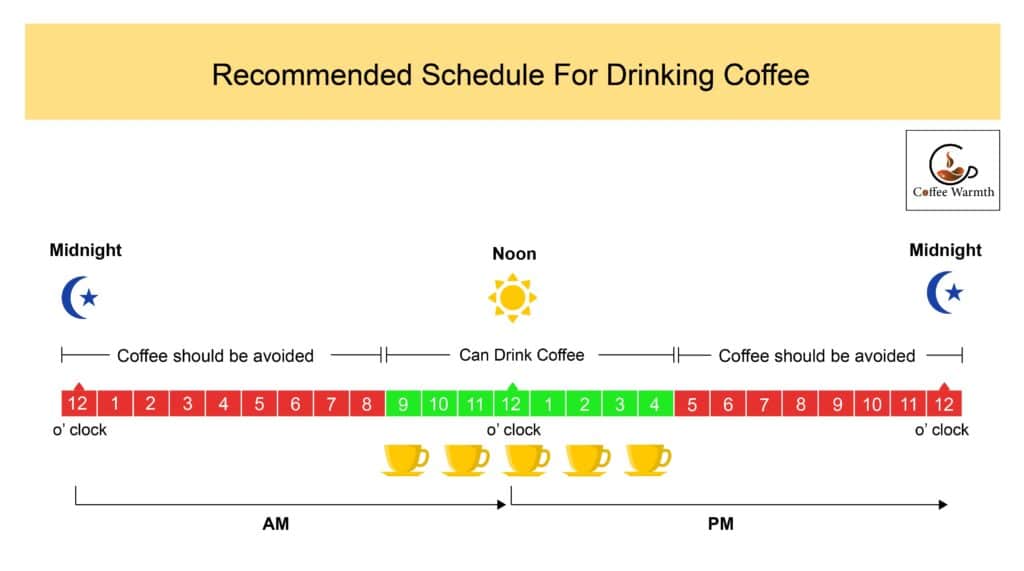
When Should You Drink Coffee in the Morning?
You should drink coffee in the morning 30 to 60 minutes after waking up. The exact time for drinking coffee in the morning varies in each individual since everyone has their own sleep and wake timings. However, an ideal time to drink coffee can be between 9-11 am as there is a cortisol dip at this time. Cortisol levels naturally peak in the morning right after you wake up and fall after 1 hour. Since drinking coffee elevates cortisol levels, you should wait an hour after waking up to prevent cortisol increase.
Furthermore, you should drink coffee after breakfast because drinking coffee before breakfast can cause stomach irritation due to gastric acid secretion. It can further raise blood sugar temporarily by decreasing insulin sensitivity, according to a study in the Journal Diabetologia.
How Long Should You Wait to Drink Coffee After Waking Up?
You should wait at least 30-60 minutes after waking up to drink coffee to allow cortisol levels to decrease after initial spike upon waking up. There is no universally recognized guideline on how long you should wait because everyone’s sleep timings and internal response to caffeine is different, according to a registered Dietitian Anthony DiMarino. However, it’s best to wait until mid-to-late morning (9-11 am) because cortisol levels significantly drop around this time.
Does Drinking Coffee Affect Hormone Levels?
Yes, drinking coffee affects levels of cortisol hormone, melatonin, adenosine, and serotonin.
Cortisol Hormone
Cortisol or stress hormone regulates the body’s stress response, glucose metabolism, sleep-wake cycle, and blood pressure.
Drinking coffee at any time during the day increases cortisol hormone. However, its effect is more pronounced in the morning, according to a study published in the Journal of Metabolism-Clinical and Experimental. This is because cortisol hormone naturally peaks after waking in the morning to initiate a cortisol awakening response which helps you wake up and become alert. Drinking coffee first thing in the morning further elevates cortisol levels that may result in anxiety and burnout, according to a study published in the Journal of Pharmacology Biochemistry & Behavior.
The graph below shows the effects of drinking coffee on cortisol levels throughout the day.
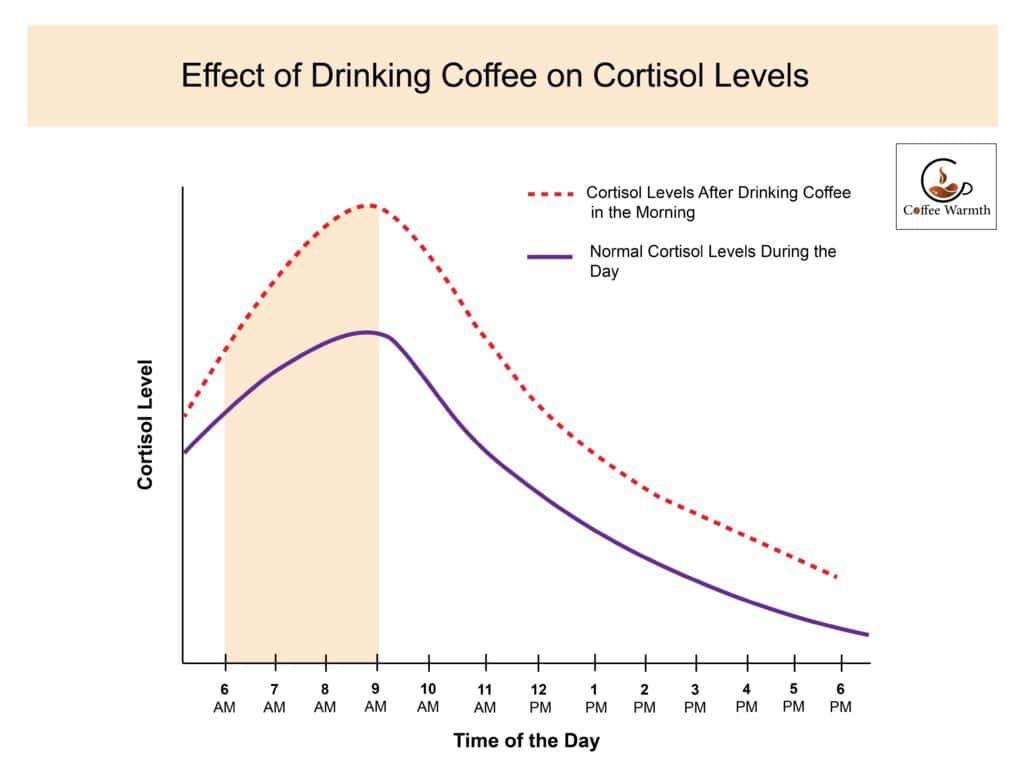
Drinking coffee regularly during cortisol’s peak trains the body to produce less cortisol and undermine cortisol’s alertness effect in the long run. Less cortisol is produced to compensate for the stimulating effects of coffee. A study in the Journal of Biobehavioral Medicine states that those who consume coffee daily in the morning have reduced cortisol levels.
Cortisol then declines throughout the day reaching a minimum between 2-4 am. Drinking coffee during the cortisol decline can raise its levels slightly. However, this rise is not significant enough to cause anxiety in healthy adults. It can still lead to anxiety feelings in people with caffeine sensitivity.
Melatonin
Melatonin regulates the sleep-wake cycle. Our bodies secrete the highest levels of melatonin during the night and lowest during the day. Drinking coffee at any time during the day i.e., in the morning, afternoon, evening, or at night decreases melatonin levels. A study in the ‘Sleep Medicine’ Journal provides evidence that caffeine in coffee reduces melatonin production.
In the morning, drinking coffee further reduces the naturally low melatonin levels and its effects on the brain. Low melatonin levels promotes alertness and focus and helps you kickstart your day.
A cup of joe in the afternoon and evening reduces fatigue and keeps you up by stimulating the sympathetic nervous system and lowering the melatonin levels.
Drinking coffee at night reduces the naturally high melatonin levels and affects your sleep quality and increases the time you need to fall asleep.
Adenosine
Adenosine is a neurotransmitter that promotes sleep and regulates other body functions. Adenosine levels increase during prolonged wakefulness in the day and reduce after a night’s sleep. Drinking coffee in the morning, afternoon, evening, or at night decreases the sleep effects of adenosine and promotes wakefulness by blocking adenosine receptors. Blockage of adenosine receptors results in activation of certain neurotransmitters like dopamine, acetylcholine, and serotonin, which increases alertness and concentration, according to Dr. Hiske van Duinen, of University Medical Center Groningen (UMCG).
Serotonin
Serotonin is a hormone that affects a wide range of body functions like sleep, mood, depression, anxiety, fatigue, and bowel functions. Drinking coffee at any time during the day, i.e., in the morning, afternoon, evening, or at night increases serotonin levels which improves your mood and reduces depression and anxiety symptoms. According to a study published in the Journal of Exercise Rehabilitation, consuming 3 mg/kg caffeine affects serotonin levels and reduces fatigue.
What Happens When You Drink Coffee in the Afternoon?
Drinking coffee in the afternoon (between 12-6 pm) affects your attention, energy, stress levels, and sleep. A cup (8 fl.oz.) of joe in the afternoon raises cortisol, melatonin, adenosine, and serotonin levels which exerts the relevant effects.
Drinking a cup (8 fl.oz.) of coffee during this time period re-energizes you for the rest of the day. Caffeine in coffee has a stimulating effect on the brain which keeps you focused and attentive after a tiring morning.
Grace E. Giles and her colleagues from Tufts University, Medford found the effects of drinking coffee and consuming taurine and glucose in the afternoon. 48 participants consumed 2 cups (16 fl.oz.) of coffee, 2000 mg taurine, and 50g glucose on separate days with a 24 hour washout time. The results concluded that drinking 2 cups of coffee (16 fl.oz.) in the afternoon consistently improved cognitive performance, especially attention, memory, and psychomotor task performance. Furthermore, 2 cups of coffee in the afternoon improved the mood of female participants.
Drinking coffee in the afternoon may or may not have any effect on the sleep cycle depending on the time you consume coffee and how quickly your body gets rid of it. Drinking coffee in the late afternoon around 4-6 pm might interrupt the sleep-wake cycle as caffeine takes about 5 hours on average to exit your body. However, a cup of coffee in the early afternoon around 12-3 pm is unlikely to disrupt your sleep patterns.
A study published in the ‘Progress in Neuro-Psychopharmacology & Biological Psychiatry’ Journal studied the effects of morning and afternoon caffeine in 12 young adults on sleep-wake cycle and cortisol levels. The participants took 150 mg caffeine (equivalent to 1.5 cups of drinking coffee) 3 times in the morning and afternoon time. The researchers didn’t find any effect on the sleep-wake cycle and cortisol levels.
What Happens When You Drink Coffee in the Evening?
Drinking coffee in the evening increases alertness and disrupts the sleep cycle at night.
Caffeine in coffee stays in the body for 2-10 hours or for 5 hours on average. Evening time is the time between sunset and dusk and is between 6-9 PM in most areas. So, drinking coffee between 6-9 PM would affect your sleeping pattern as caffeine takes 5 hours on average to wear off from the body.
A study in the ‘Sleep Medicine’ Journal shows that drinking coffee in the evening hours decreased sleep time by 80 minutes, increased time to fall asleep by 20 minutes, and decreased sleep efficiency by 20% in 6 healthy individuals.
Another study in the International Journal of Sports Medicine found that an evening cup (8 fl.oz.) of coffee reduces sleep quality at night in female athletes.
Drinking coffee in the evening time also enhances alertness, vigilance performance, and learning, says Gary Christopher, a gerontologist working at Swansea University.
What is the Effect of Drinking Coffee at Night?
The effects of drinking coffee at night are increased alertness, increased sleep latency (time to fall asleep), decreased sleep quality, and reduced sleep time or insomnia.
The effects of drinking coffee at night is illustrated in the figure below.
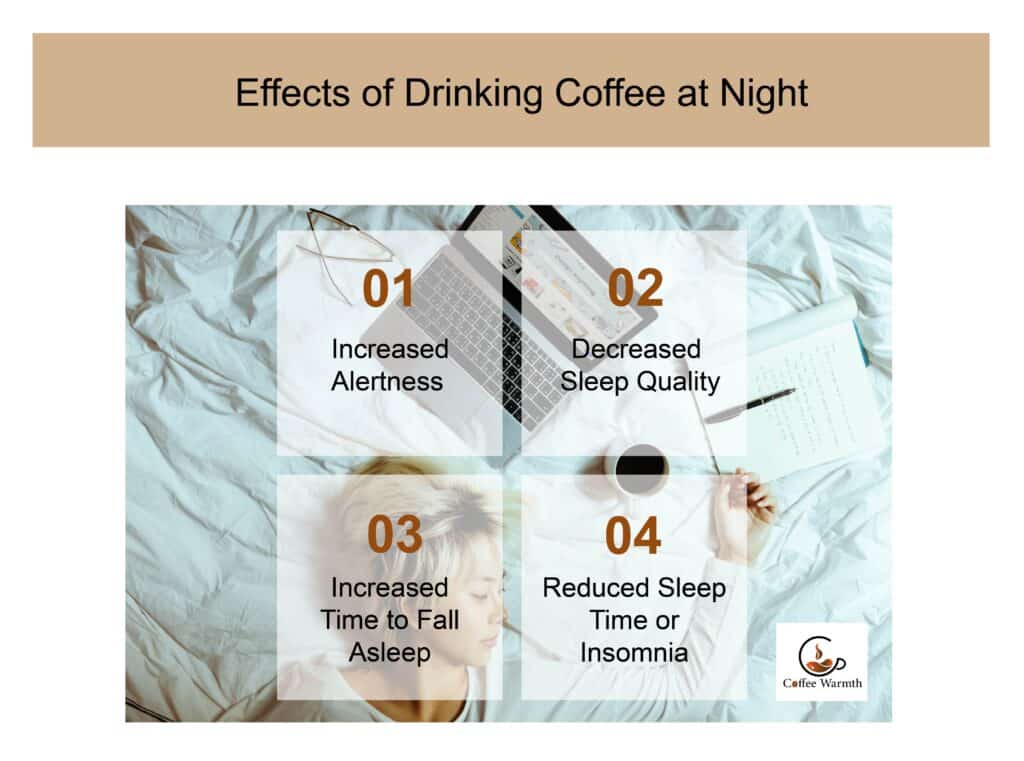
Drinking coffee at night or before bedtime increases alertness due to the effect of caffeine on adenosine receptors. Caffeine blocks adenosine receptors and increases alertness at nighttime as stated by a study in the Journal ‘Neuropsychobiology’. Ardith Zwyghuizen-Doorenbos from University of Illinois at Chicago in her study concludes that caffeine in coffee enhances alertness and increases the time to fall asleep.
Drinking coffee at night makes it difficult for you to fall asleep. A study in the Journal Nutrition & Dietetics followed 63 healthy individuals who were divided in two groups. First group drank one cup of caffeinated coffee of 90 mg caffeine and the second group got a cup of decaffeinated coffee of 4.5 mg caffeine. The results showed that the individuals drinking one cup of caffeinated coffee took more time to sleep and woke up often at night than the decaffeinated group.
Another effect of drinking coffee at night is decreased sleep quality. A study published in the Journal ‘Sleep Medicine’ examined the effects of caffeinated and decaffeinated coffee at night on sleep quality and melatonin production. The results found that the caffeinated coffee group had less sleep time and decreased sleep quality compared to the decaffeinated one. Another important finding of this study was that caffeinated coffee decreased the production of melatonin.
All the effects of drinking coffee at night lead to reduced sleeping hours or insomnia. A study published in the Journal ‘Sleep’ examined the effects of 400 mg caffeine equivalent to 4-5 cups (32-40 fl.oz.) of drinking coffee in 12 healthy young adults. 400 mg caffeine was administered 3 times a day at 8 am, 4 pm, and 11 pm for 15 days. The results showed symptoms of insomnia and increased sleep latency in these individuals.
Does Drinking Coffee at Night Affect Sleep Cycle?
Yes, drinking coffee at night affects the sleep cycle. Caffeine in drinking coffee antagonizes adenosine receptors which controls sleep cycle through melatonin levels. Melatonin is produced 2 hours before your usual bedtime but drinking coffee before bed reduces melatonin levels and decreases sleep time as stated in a study in the Journal ‘Sleep Medicine’.
A normal sleep cycle consists of 5 stages; wakefulness, non-rapid eye movement (NREM) stage 1,2, and 3, and rapid eye movement (REM) stage. Disruption in even one stage of sleep cycle reduces overall sleep quality. The book ‘Progress in Brain Research’ states that a cup of coffee (8 fl.oz.) or 100 mg caffeine affects both NREM and REM stages in healthy individuals.
When Should You Stop Drinking Coffee Before Bed?
You should stop drinking coffee 6 hours before bed. Caffeine in coffee can stay in your body for 2-12 hours and on average for 5 hours, according to a book by the Institute of Medicine (US) Committee on Military Nutrition Research.
The diagram below shows that when you should stop drinking coffee before bed.
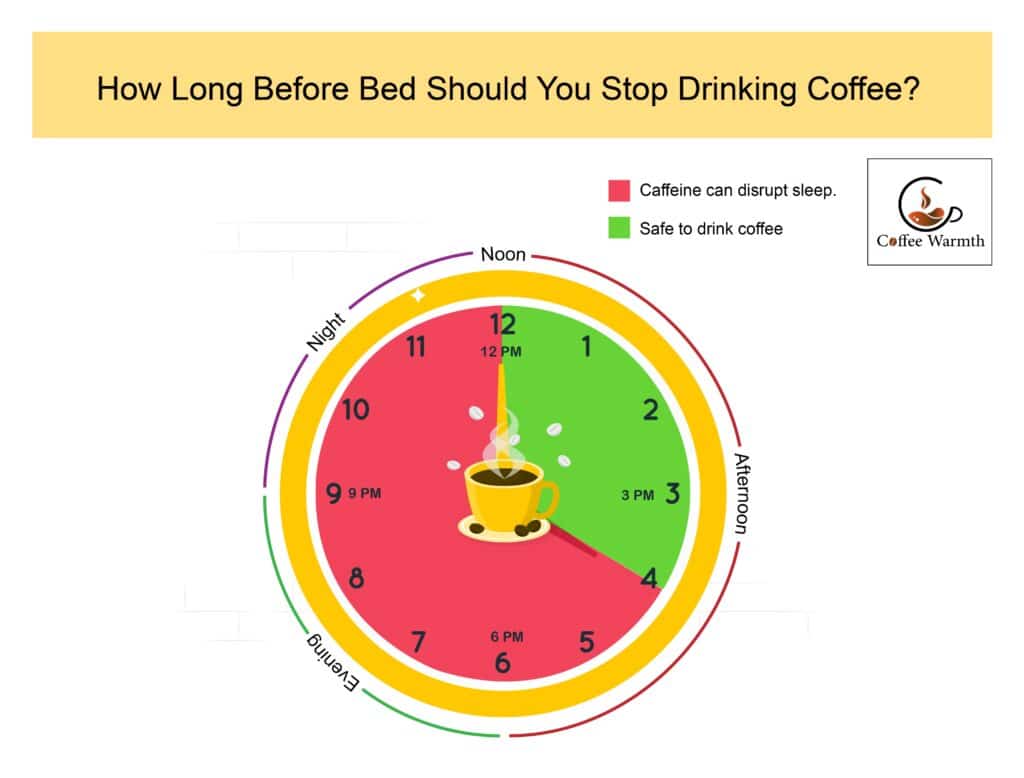
A study conducted in the Detroit tri-county on 12 healthy young adults examined the effects of caffeine taken 0 hours, 3 hours, or 6 hours before going to bed. On day 1, each individual took 400 mg caffeine (equal to 4-5 cups or 32-40 fl.oz. of drinking coffee) 6 hours before sleep and a placebo dose at 3 and 0 hours before sleep. It was then followed by a rest day. The same protocol was followed for caffeine consumption at 3 hours and 0 hours before sleep. The results concluded that caffeine consumption at 0 hours, 3 hours, and 6 hours before bed significantly disrupts sleep pattern. Thus, you should stop drinking coffee 6 hours before bed to maintain good sleep.
How Long Does Coffee Keep You Awake?
How long coffee keeps you awake also depends on the dosage of coffee, time of coffee intake, caffeine half life, and how sensitive you’re to coffee. For example, drinking 4 cups (32 fl.oz.) of coffee will keep you awake longer than 1 or 2 cups (8-16 fl.oz.).
Christopher L Drake, PhD and Timothy Roehrs, PhD, sleep experts, in their study found that those consuming 400 mg caffeine equivalent to 4-5 cups or 32-40 fl.oz. of coffee 30 minutes before bedtime took 43 minutes to fall asleep. Those consuming 400 mg caffeine 3 hours and 6 hours before bed took 37 and 44 minutes to sleep respectively. All individuals consuming caffeine at either time reported poor sleep quality during the rest of the night.
The line graph below is drawn according to previously mentioned scientific study.
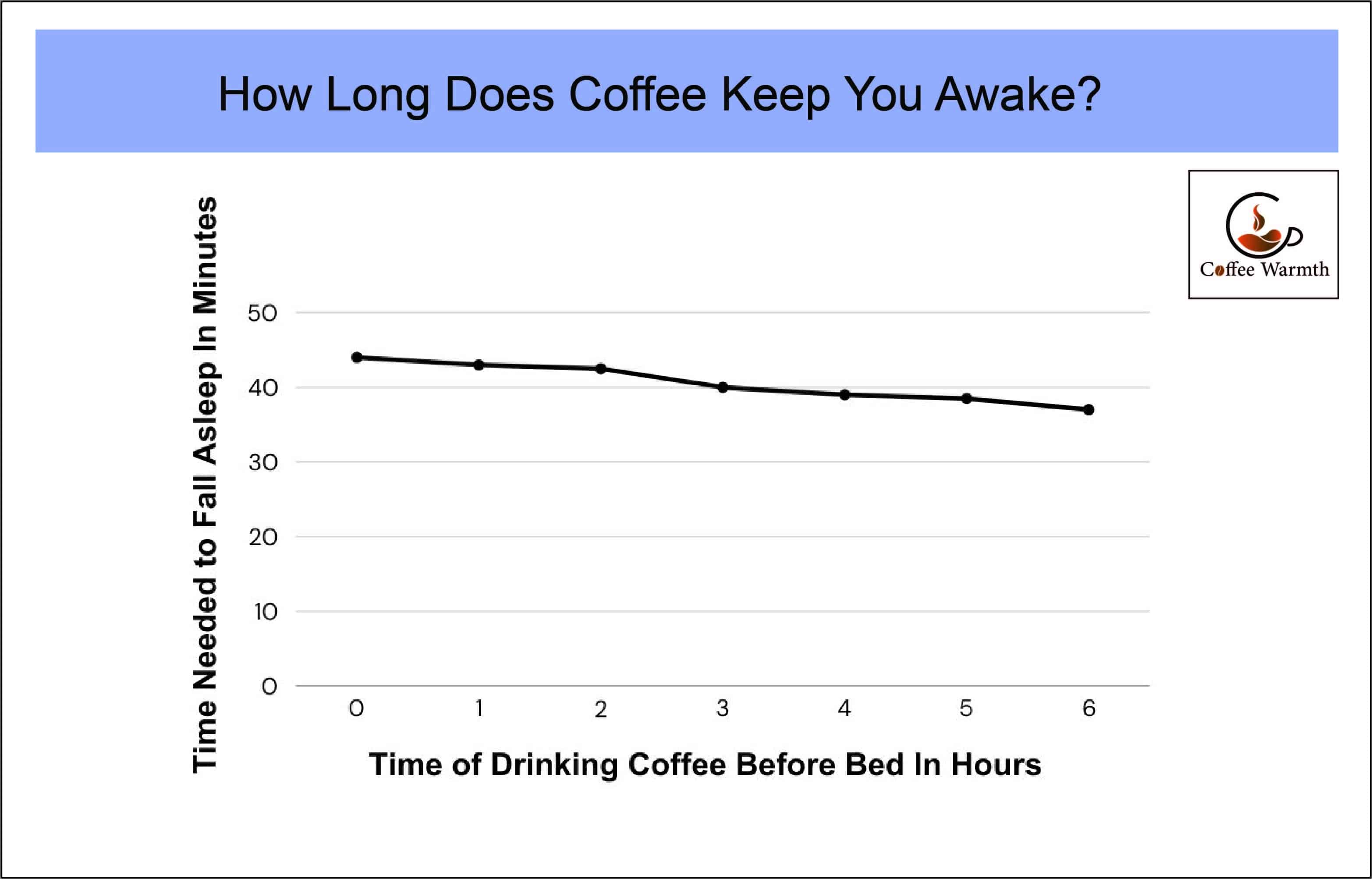
How Long Does Coffee Take to Kick in?
Coffee takes 15-60 minutes to kick in or get efficiently absorbed by the stomach and small intestine and peaks in the blood within 30 minutes. The effect of coffee stays for 2-10 hours depending on individual variation of caffeine’s half life, according to a study published in the Journal of Hepatology. Different effects of coffee take different amounts of time to come into action.
The graph shows the time coffee takes to kick in the body.
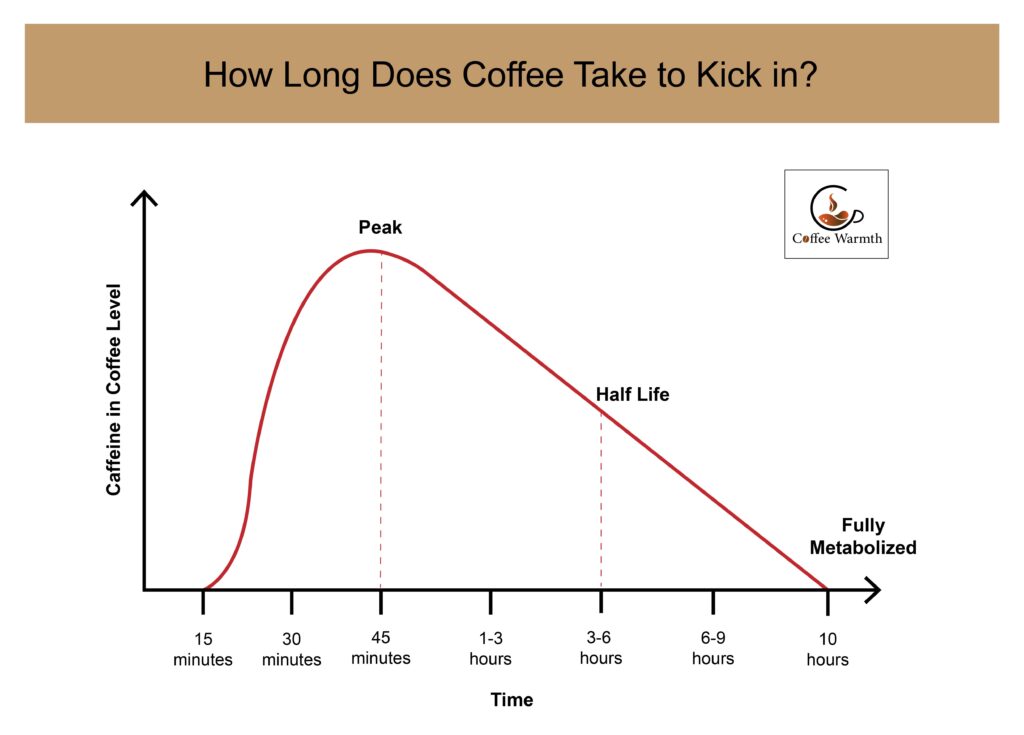
A study published in the Peer-reviewed Journal ‘Physiology & Behavior’, researched on the effect of coffee on mental performance and mood within 30 and 60 minutes of consumption in healthy English individuals. The results showed that individuals showed enhanced performance and mood at 30 and 60 minutes after coffee ingestion.
Another study in the Journal Nutrients concludes that consuming 5 mg/kg bodyweight of caffeine 60 minutes before Taekwondo increases reaction time in combat for at least 2 hours.
For the sleep cycle, drinking coffee causes sleep disturbances within 30 minutes of consumption, a study published in the Risk Management and Healthcare Policy Journal states.
What is the best time to drink coffee for weight loss?
The best time to drink coffee for weight loss is in mid-morning between 9-11 am, one hour before meal, and 60 minutes before hitting the gym.
Drinking coffee in mid-morning boosts your metabolism throughout the day. An increase in metabolic rate burns more calories at rest and during exercise. Additionally, a cup (8 fl.oz.) of coffee before any meal suppresses your appetite during the day which helps you control your diet. Both an increase in metabolic rate and appetite suppression helps with weight loss.
Another time to drink coffee for weight loss is 60 minutes before workout or exercise as suggested by the International Society of Sports Nutrition (ISSN). A cup of coffee (8 fl.oz.) an hour before exercise enhances your physical activity and helps burn more calories.
What is the best time to drink coffee to enhance exercise performance?
The best time to drink coffee to enhance exercise performance is 60 minutes before exercise.
According to the International Society of Sports Nutrition (ISSN) 3-6 mg/kg bodyweight of caffeine in the shape of coffee 60 minutes before exercise enhances physical performance in both trained and untrained individuals.
A meta analysis published in the British Journal of Sports Medicine also found that drinking 2-3 cups of coffee (16-24 fl.oz.) for a 60-90 kg or 130-200 lbs individual an hour before aerobic or anaerobic activity increases muscle endurance and strength, anaerobic power, and aerobic endurance.
When is the best time to drink coffee for studying?
The best time to drink coffee for studying is whenever you feel tired or exhausted. As a general rule, drinking coffee between 9-11 am in the morning, 2-4 pm in the afternoon, or 6-9 pm in the evening can help you stay focused for the whole day. Usually, caffeine in coffee takes 30 minutes to kick in, so consuming coffee 30 minutes before studying will help increase focus and memory.
Waheeb D. M. Alharbi and his colleagues from Ummul Qura University found in their study that consuming both coffee robusta and arabica 30 minutes before studying activities enhanced cognitive function and attention. However, coffee arabica was more effective in improving alertness and short term memory than coffee robusta.
Nelson Granja and his associate from University of Virginia found that having coffee before traditional exams reduces stress and increases exam performance in engineering students.
Is it Better to Drink Coffee Before or After a Meal?
It is better to drink coffee 30-60 minutes after a meal because it speeds up digestion and does not reduce absorption of important minerals. It takes 24-72 hours for food to digest but coffee moves the food in the stomach and intestine quickly.
It is also better to drink coffee after a meal because drinking coffee before a meal on an empty stomach raises blood sugar level and cortisol hormone. Consuming coffee before a meal may also irritate the stomach lining. So, it is better to have coffee after eating your meal.
